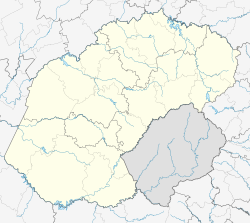Ficksburg | |
|---|---|
Clockwise from top: View of Ficksburg from Imperani Mountain, Old Building, NG Church. | |
| Coordinates: 28°52′25.3″S 27°52′41.2″E / 28.873694°S 27.878111°E | |
| Country | South Africa |
| Province | Free State |
| District | Thabo Mofutsanyane |
| Municipality | Setsoto |
| Established | 1867[1] |
| Area | |
• Total | 50.4 km2 (19.5 sq mi) |
| Elevation | 1,628 m (5,341 ft) |
| Population (2011)[2] | |
• Total | 5,400 |
| • Density | 110/km2 (280/sq mi) |
| Racial makeup (2011) | |
| • Black African | 37.2% |
| • Coloured | 7.0% |
| • Indian/Asian | 12.0% |
| • White | 42.3% |
| • Other | 1.5% |
| First languages (2011) | |
| • Afrikaans | 50.9% |
| • English | 22.4% |
| • Sotho | 17.9% |
| • Other | 8.8% |
| Time zone | UTC+2 (SAST) |
| Postal code (street) | 9730 |
| PO box | 9730 |
| Area code | 051 |
Ficksburg is a town situated at the foot of the 1,750 meter high Imperani Mountain in Free State province, South Africa. The town was founded by General Johan Fick in 1867 who won the territory in the Basotho Wars. He laid out many erven and plots that could be bought at a reasonable price. It is located on the north bank of the Mohokare River, which separates it from the town of Maputsoe in Lesotho. The town was later proclaimed a municipality in 1891. The last Governor-General of the Union of South Africa and the first State President of South Africa, Charles Robberts Swart was imprisoned here by the British in 1914 and released one day before his scheduled execution.
- ^ Robson, Linda Gillian (2011). "Annexure A" (PDF). The Royal Engineers and settlement planning in the Cape Colony 1806–1872: Approach, methodology and impact (PhD thesis). University of Pretoria. pp. xlv–lii. hdl:2263/26503.
- ^ a b c d Main Place] Ficksburg from Census 2011.





